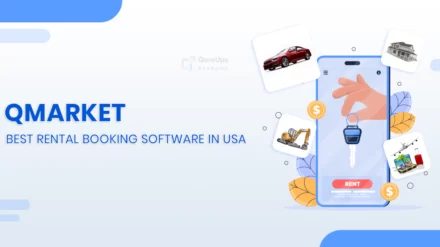In the current digital era, when the simplicity of maintaining and booking properties may have a substantial impact on the performance of rental enterprises, developing an effective, user-friendly vacation rental management software is essential.
Entrepreneurs may create customized solutions that cater to the unique requirements of property owners, managers, and visitors by utilizing platform builders.
However, creating vacation management software that stands out in a competitive market requires careful consideration of several important variables.
An in-depth analysis of seven crucial elements is provided in this blog article, along with helpful hints and advice to help developers and companies design vacation rental management software.
Understanding The Vacation Rental Landscape
It’s important to understand the vacation rental market before delving into the specifics of vacation management software development.
For tourists looking for distinctive and customized experiences, vacation rentals have been a popular lodging option throughout the last ten years.
The way people book lodging has been completely transformed by websites like Booking.com, Airbnb, and Vrbo, which has given property managers and owners access to a wealth of new business prospects.
The rising demand for vacation rentals has highlighted the need for effective management systems and laid the foundation for creative vacation rental management software solutions.
Identifying Market Needs and Opportunities
To develop successful vacation rental management software, it’s crucial to identify the needs and pain points of property owners, managers, and guests.
Conducting thorough market research will enable you to understand the gaps in existing solutions and pinpoint opportunities for innovation.
Engage with industry professionals, attend conferences, and leverage online forums to gain insights into emerging trends and challenges faced by stakeholders in the vacation rental ecosystem.
Defining Your Target Audience
One of the key considerations in vacation rental management software development is defining your target audience.
Depending on your vacation management software’s niche and specialization, your target audience may vary.
Are you catering to individual property owners managing a handful of listings, or are you targeting professional property management companies with extensive portfolios?
Understanding your target audience’s preferences, workflows, and pain points will guide your software’s feature set and user experience design.
7 Considerations and Best Practices
When building the best vacation rental management software, consider the following technical considerations and best practices
Prioritizing User Interface (UI) and User Experience (UX) Design
Why It Matters
The UI and UX design form the backbone of any software application.
In the context of vacation rental management software, they dictate how easily users can navigate the system, complete bookings, manage listings and access various functionalities.
An intuitive design not only attracts users but also retains them, while a complicated interface can drive potential users away.
What to Do
Focus on creating a clean, engaging, and intuitive interface.
This includes optimizing the layout, ensuring consistency in design elements, and providing clear calls-to-action (CTAs).
Usability testing plays a crucial role here; gathers feedback from real users and iterates on the design to enhance the user experience continually.
Ensuring Customization and Scalability
Why It Matters
The vacation rental industry is diverse, with businesses ranging from single-property owners to large agencies managing hundreds of listings.
The best vacation rental management software must be customizable to cater to various needs and scalable to grow with the business.
What to Do
Select a marketplace platform builder that allows for easy modifications and additions. Use modular architecture where possible, enabling you to add or modify features without disrupting the core functionality.
Scalability also means the vacation management software should perform well under varying loads, ensuring a smooth experience as the number of listings or transactions increases.
Integrating With Key Systems and Services
Why It Matters
Integration capabilities extend the functionality of the best vacation rental management software, allowing it to work seamlessly with payment gateways and other tools.
These integrations automate processes, streamline operations, and offer a more cohesive user experience.
What to Do
Build your software with API integration in mind.
Whether it’s for pulling in listings from other platforms, processing payments, or syncing with accounting software, ensure your system can easily connect with external services.
This not only enhances functionality but also positions your vacation management software as a versatile tool for users.
Emphasizing Security and Data Protection
Why It Matters
With increasing cyber threats and strict data protection regulations, security is non-negotiable.
Users entrust your vacation management software with sensitive information, including personal details and payment information, making robust security measures essential.
What to Do
Implement industry-standard security practices, such as SSL encryption, secure authentication methods, and regular security audits.
Compliance with data protection laws (e.g., GDPR, CCPA) is also critical.
Educate your users on best practices for data security to further protect their information.
Offering Mobile Accessibility
Why It Matters
The surge in mobile device usage has made mobile accessibility a critical feature for any software.
For vacation rental management, this means enabling property owners and managers to manage their listings on the go and allowing guests to make bookings and check details from their mobile devices.
What to Do
Develop a responsive web application or a dedicated mobile app, ensuring that all functionalities are accessible and optimized for mobile devices.
This approach not only caters to the mobile-first audience but also enhances the overall user experience, making your vacation rental management software more competitive.
Incorporating Reporting and Analytics
Why It Matters
Data-driven insights are invaluable in the vacation rental industry. They help businesses optimize pricing, improve occupancy rates, and enhance guest satisfaction.
Vacation management software equipped with comprehensive reporting and analytics tools can provide these insights, enabling users to make informed decisions.
What to Do
Integrate analytics functionality that covers key performance indicators (KPIs) such as booking rates, average nightly rates, seasonal trends, and customer behavior.
Offer customizable reports and dashboards that users can tailor to their specific needs, providing them with actionable insights at their fingertips.
Providing Exceptional Customer Support and Training
Why It Matters
Even with the most intuitive software, users may encounter issues or have questions.
Providing timely and helpful customer support can significantly enhance user satisfaction and loyalty.
Additionally, offering training and resources helps users maximize the software’s value.
What to Do
Develop a comprehensive support system that includes live chat, email support, and a knowledge base with FAQs, tutorials, and guides.
Consider offering webinars or in-person training sessions for more complex functionalities.
A robust support system not only helps retain users but also reduces the learning curve associated with new software.
Conclusion
Building the best vacation rental management software that meets the needs of today’s dynamic rental market is a complex task.
However, by focusing on the seven critical factors outlined above, developers and businesses can create a product that stands out for its usability, functionality, and security.
Platforms like QMarket provide the foundational tools and flexibility needed to tackle these challenges, enabling the creation of powerful, customized solutions that drive the success of rental businesses worldwide.
As the vacation rental business continues to evolve, staying ahead of technological trends and user expectations will be key to building the best vacation rental management software that not only meets the current demands but is also future-proof.
With careful planning, a user-centric approach, and a commitment to quality, your vacation rental management software can become an indispensable tool for property managers and an attractive choice for guests seeking their next vacation rental.






